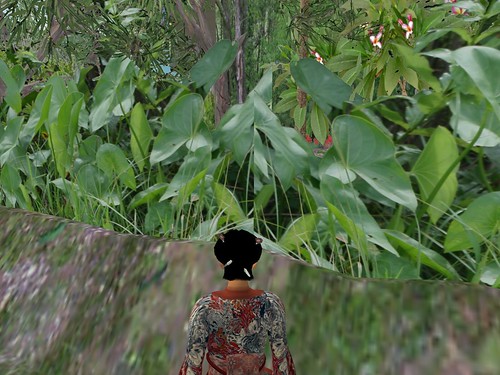Supposedly J.B.S. Haldane said something to the effect that God has an "inordinate fondness for beetles." Now don't quote me on this because I wonder if this isn't one of those sayings that has gotten twisted around and taken out of context. But it is a great phrase whatever the origin. (See
this link for further discussion of this quote's origin.)
Finding this wonderful fig eater,
Cotinis nitida got me thinking about this quote and a few more cosmic issues. I don't know. Must be incipient heat stroke.
 During the intelligent design controversy
During the intelligent design controversy, ID proponents liked to say that all we can say about the designer is that design exists and that we cannot infer anything about the designer. So I half jokingly said that maybe we can infer that the God- excuse me, designer- was really fond of beetles. The response I got was quite clever, as ID responses often are. Namely: would a carpenter be fond of nails because he needs lots of them to build a house?
If I had been a bit quicker I might have commented on what this says about the ID view point. It really is all about purpose, human purpose, just as the old style creationism is. All the creatures around us are merely nails in some sort of grand scheme. The beetle is just a nail in a house. Whose house is it? God's house or our house. And why make such intricate nails? Why make anything at all?
The belief that the universe has a purpose is so ingrained in our minds that it often hinders our ability to think about the Universe. For instance we commonly believe in the balance of nature and that every species has its place- the niche. My students will tell me that plants carry out photosynthesis to produce oxygen. Never mind that oxygen is a waste product of photosynthesis. Many of them just don't get it.
And its not just students who's sight is blinded by purpose. Otherwise sophisticated people sometimes will say that being gay is a way of population control- sort of a group selectionist idea a la
V.C. Wynne-Edwards. During the 70's and 80's scientists seriously proposed that the Earth is a great self regulating system. This is the "Gaia hypothesis" of
James Lovelock and that of course blends into some slippery versions of the anthropic principle which are stated as saying that the Universe is the way that it is because we are here. And that blends
Frank Tipler's notions about the fate of the universe. He claims that eventually life will fill and control the universe and through its quantum mechanical interactions with the universe reach some sort of Omega Point that he identifies with God.
Now this is an appealing notion for me because it seems to be a sort of self assembly of the sort we encounter all through out biology extended to a cosmic scale. Life bootstrapping itself up into greater and greater complexity without intervention of some sort of external intelligence. To
quote Tipler:
"I also argue that the ultimate future state of the universe, the Omega Point, should be identified with God. ...If we regard God as something Ultimate, then He is telling us that He is the Ultimate Future. "
So God in the future is influencing the past, presumably through some sort of quantum mechanical entanglement. Very self referential sounding indeed. And at the same time a lot like manifest destiny-only it is life that has as its manifest destiny to become God with the power to resurrect the dead.
Of course if you are Christian, God does have that sort of ultimate power. But it seems that Tipler, like the Intelligent Design advocates, and perhaps even the group selectionists and Gaia advocates, are trying to hammer the universe into a shape that is a reflection of what we are are.
Now the impulse to do that is understandable. After all, in terms of our own evolution, the ability to bend and chip matter for our own uses and by extension modify our environment to suit our very human purposes has served us in good stead. I would not want us to retreat into some sort of technological passivity. Nor do I disavow all notions of purpose. But I believe we constantly have to 'guard or minds' against the very powerful and subtle illusion that our notions of purpose have any scientific meaning in terms of the universe. A beetle otherwise becomes merely a funny looking nail and plants produce oxygen so we can breathe.









